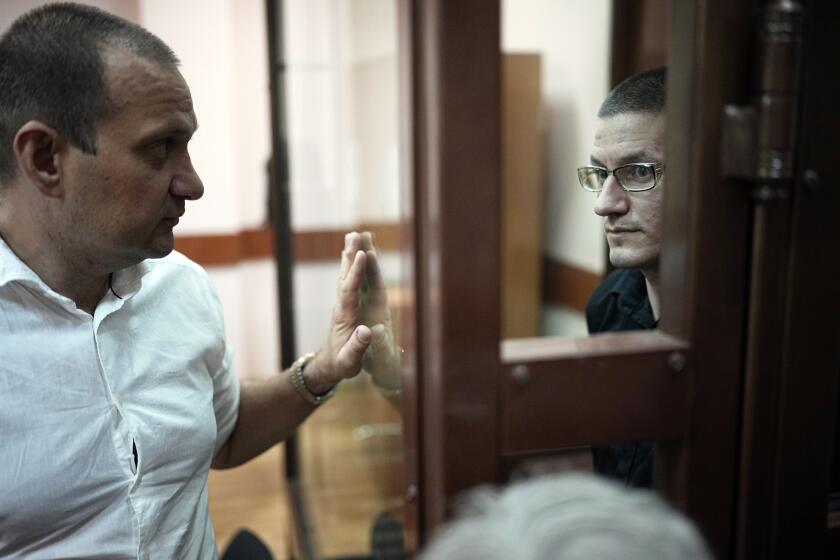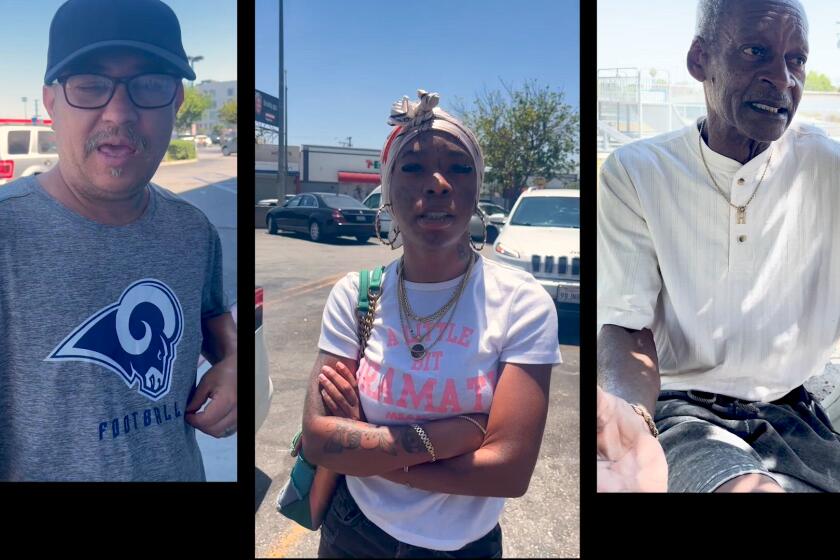Fraternity Violence: The Pledging Debate : The Greeks: There is a move afoot to do away with hazing, but the traditionalists are outraged and vow to fight.
The scar on his buttocks is a permanent reminder of how important it was to him, just four years ago, to get into a fraternity. He endured almost seven weeks of rigorous hazing--paddling, face-slapping, body-punching and worse--and he became a respected brother for it.
What he now regrets, he says, more than the blows he took, is the punishment he laid on the next batch of pledges. When his turn came to carry on the chapter’s secret tradition of hazing, he did it with gusto.
“I’ve never been a violent person,” says this 23-year-old graduate of a mid-sized Southern university. “I’m still not a violent person.” Yet as a “big brother” he would slap pledges hard across the face, sometimes for no reason, fully confident that none of them would dare lift a hand against him.
And he would feel no remorse. “That is what scared me the most,” he says. “It’s just amazing what you can do to other people.”
The four national Greek-letter fraternities for African Americans--Alpha Phi Alpha, Kappa Alpha Psi, Omega Psi Phi and Phi Beta Sigma--can claim many illustrious members, among them Thurgood Marshall, Jesse Jackson, L. Douglas Wilder, Tom Bradley, David Dinkins and Walter Fauntroy. Alumni chapters pride themselves on their volunteerism, and on being a network for black professionals.
But on college campuses, black fraternities have a reputation for distinctively violent hazing. So violent, in fact, that the leaders of those four fraternities, and of the four national black sororities, have made a stunning decision: They want to abolish “pledging,” the traditional period of indoctrination and testing before a student becomes a full-fledged brother or sister. They want to develop a whole new way of bringing in members--one that doesn’t involve physical or psychological pressure.
And they say the very survival of the fraternities and sororities depends on it.
“People are being killed. People are being maimed. Lawsuits are being levied against the organizations,” says Carter D. Womack, national president of Phi Beta Sigma. “Unless we take some serious action to eliminate hazing, we could all be out of business, plain and simple, because of somebody acting a fool.”
Traditionalists, of whom there are many in the fraternity system, are outraged by plans to do away with pledging. “A lot of the undergraduate chapters are trying to mobilize undergraduates to oppose this,” says Marlow Martin, a University of Maryland senior and head of the campus Panhellenic Council, which represents the eight black Greek organizations.
Martin says he was paddled, slapped and kicked when he joined the Omegas in 1986. But “I would definitely do it again,” he says. “Nothing happens that you do not consent to.” One reason he chose Omega Psi Phi in the first place, he says, was “I heard it was the hardest one to pledge.”
“The pledge process brought a lot out of me,” Martin says. “It pushes you to your physical and mental limits. It makes you depend on other people and support each other.” He believes that a “physically and mentally challenging” indoctrination is crucial to building a strong brotherhood. “The way they’re talking about changing, we might as well be the NAACP--sign your name, you’re a member. What’s the difference? What’s the bond that makes us separate?”
Moses Norman, the Omegas’ national president, says: “The youngsters--and some oldsters, too--are dealing more with mythology than truth. We are not the Marine Corps. We’re not the Green Berets. We’re organizations made up of scholarly men and women. . . . It has gotten completely out of hand.”
In Omega Psi Phi alone, during the 1980s, a Tennessee State University student died of alcohol poisoning after a forced drinking binge on initiation night--his body was also bruised; a pledge at Lamar University in Texas died while running laps as part of a hazing ritual; a University of Pittsburgh student suffered a ruptured eardrum while being beaten by fraternity members; a pledge at North Carolina A&T; was scarred when someone set fire to his beard, and a pledge at Norfolk State University had his jaw broken in two places.
For Kappa Alpha Psi and Phi Beta Sigma, the decision has already been made by their executive boards: No more pledge period, as of the coming fall semester. “There is nothing in Kappa Alpha Psi worth a young man losing his dignity,” says the Kappas’ national president, Ulysses McBride. “There is nothing worth his losing a limb.”
But two fraternities--Omega Psi Phi and Alpha Phi Alpha--will confront this extremely emotional issue during their national “conclaves” this summer. Their members could choose to ignore the leadership and vote to maintain pledging. One anti-hazing advocate puts the odds at 50-50. “I’m scared to death,” he says. “Tradition is very, very powerful.”
In December 1988, after his first semester at Morehouse College, Joel A. Harris returned to his home in the Bronx and said, “Mom, I’m going to be an Alpha man.”
Morehouse required that students wait until their sophomore year before joining a fraternity. But already, Joel had learned some Alpha Phi Alpha history and some “steps”--precision dance moves that are part of perhaps the showiest element of black Greek life, the competitive “step show.”
By last summer, he was certain--Joel told his mother he would be pledging in the fall. She suggested that he wait.
“I said to him, “I think your (grade point average) is more important,’ ” recalls Adrienne Harris, “because I know pledging takes a lot of time from studies, even though it’s not supposed to. You’re doing so well. I don’t want to see that drop.’
“He said, ‘Mom, I can handle both.’ ”
Joel Harris was preparing for a career in business law. He was attracted to Alpha Phi Alpha, the oldest of the black fraternities, because of the political and social leaders who have been “Alpha men”--Martin Luther King Jr., Atlanta Mayors Andrew Young and Maynard Jackson, District of Columbia Mayor Marion Barry. Belonging to this brotherhood “is something he thought was very, very important,” Harris says, especially “at a premier black college.”
Before Joel returned to school, his mother told him, “Just be careful.” She suspected there would be some sort of “pranks” involved in pledging. He said, “Mom, I know when too much is too much.”
“They all know there will be some of that,” Harris says, “because these are the tales and fish stories men talk about.”
Around 3 a.m. on Wednesday, Oct. 18, Adrienne Harris was awakened by her telephone. It was the dean of student affairs at Morehouse College, calling to inform her that her 18-year-old son--her only child--was dead.
Joel had collapsed two hours earlier in an apartment outside of Atlanta. He was one of 19 Morehouse students in the room who wanted to pledge Alpha Phi Alpha. They were being overseen by fraternity members, though the school-sanctioned pledging period hadn’t yet begun.
To this day, Harris doesn’t know exactly what happened to her son at that secret gathering. His death was attributed to an irregular heart rhythm, the result of a congenital defect. (He had undergone corrective heart surgery at age 2, but that didn’t seem to interfere with his physical development. “Joel has been very athletic all of his life,” Harris says. “Little League, gymnastics, karate.”)
Investigators from the Cobb County medical examiner’s office found that Joel Harris and the other aspiring pledges were being hazed. Hours before he died, Joel had been punched in the chest and slapped in the face as part of a ritual that eyewitnesses called “thunder and lightning.” It’s unclear whether he was being hit when he collapsed.
The medical examiner’s report didn’t declare the hazing to be a “direct cause” of Joel’s death, but it stated that he was “under an intensive amount of anxiety and stress” that night.
Eight Alphas have been charged with hazing, a misdemeanor in Georgia since 1988. Each of them faces a maximum fine of $500. (After this highly publicized case, the Georgia Legislature reclassified hazing as a “high and aggravated” misdemeanor, punishable by 12 months in prison or a $5,000 fine.)
“We were trying to revive Joel for 10 minutes. It seemed like 10 hours,” said Randy Richardson, one fraternity member, during a press conference last November. “There are no words that you can use to explain the feelings that you go through when someone passes in your arms. . . . That’s a tragic experience I will have to endure forever.”
The most painful irony, for Adrienne Harris, is that black fraternities were founded on noble principles. “If they told me my son had a heart attack giving food to the homeless, I could live with that,” she says. “Or had a heart attack tutoring a young kid, I could live with that. Or had a heart attack in the library studying the history of the Alphas, I could live with that.
“But horsing around, I can’t live with.”
At least 50 college students, nine of them black, have died in the last 15 years because of fraternity or sorority hazing, according to anti-hazing activist Eileen Stevens of Sayville, N.Y. Her count is based on news reports and personal contact with the families of victims.
Her own son, Chuck, died of alcohol poisoning and exposure in 1979 while pledging a local fraternity at Alfred University in New York. On a freezing February night, he was thrown into the trunk of a car with two other pledges. They were ordered to drink a bottle of whiskey and a mixture of beer and wine while fraternity members drove them around.
In the years since, Stevens, who is white, has lobbied for anti-hazing legislation and has spoken at hundreds of colleges and universities. More than 30 states have passed anti-hazing laws in the last decade.
Hazing injuries in white fraternities, Stevens says, usually result from heavy drinking--”coercive chugging,” in her words--or “hours of rigorous exercise, combined often with sleep deprivation.”
There are exceptions. “I have seen color photographs of bloodied, bruised, blistered behinds of young (white) men on a Texas campus who have been subjected to that physical brutality for decades,” Stevens says. And a University of Illinois student, while pledging a predominantly Jewish fraternity last year, was thrown to the floor, punched and slammed against a wall. He suffered a concussion.
But observers of white and black fraternities, including black Greeks themselves, say that slapping pledges around is much more common among blacks. And nobody knows why.
“I’ve come to think it has to do, No. 1, with a macho attitude,” says Charles Wright, an administrator at Baltimore’s Coppin State College and a past national president of Phi Beta Sigma. “It’s almost mystical, the kind of energy that goes into fraternity life during the pledge period.”
For years, Wright has spoken out against hazing, and he welcomes the demise of pledging. But until recently, he says, the black Greek leadership has avoided the issue. (The national organizations have long prohibited hazing, and have suspended or fined chapters that got caught at it, and even expelled members. But black fraternity leaders concede there has been a need for “better monitoring” of undergraduate pledging.)
“There are alumni brothers who are worse than any undergraduates I’ve ever seen in wanting to hold onto that tradition,” Wright says. “I’ve given speeches where people walked out on me.”
“My outrage over the pledge process has evolved because of what I’ve seen happening over the last two decades to African American men in our society,” Wright says. “There is enough abuse in general. For us to be abusive to one another, in order for someone to become a member of a fraternity, is absurd.
“I come across bright, committed, community-conscious young men across this country who choose not to join a fraternity because they are not going to allow themselves to be subjected to the indignities and the nonsense we subject them to,” he says. “And that’s the system’s loss. And it’s the community’s loss.”
Among the sororities--Alpha Kappa Alpha, Delta Sigma Theta, Zeta Phi Beta and Sigma Gamma Rho--hazing isn’t nearly as violent. But Janet Ballard, national president of AKA, has heard of sisters slapping pledges, or requiring them to “take a certain position--bending over, for instance--and remain in that position for hours at a time.”
More to Read
Start your day right
Sign up for Essential California for news, features and recommendations from the L.A. Times and beyond in your inbox six days a week.
You may occasionally receive promotional content from the Los Angeles Times.






